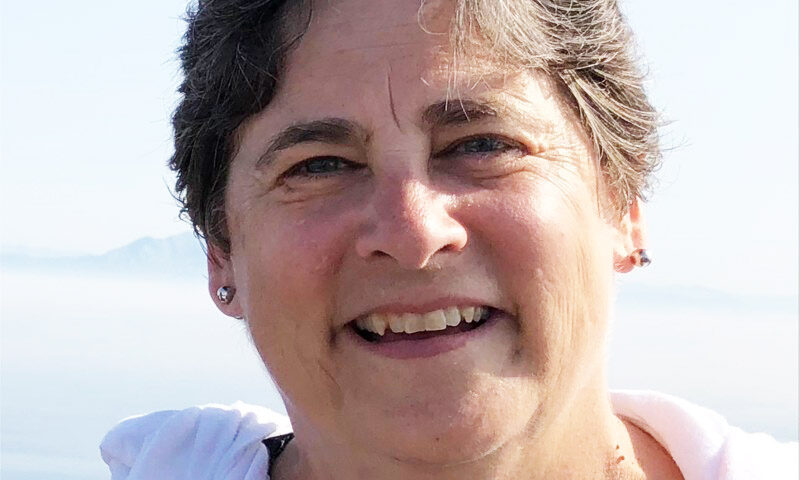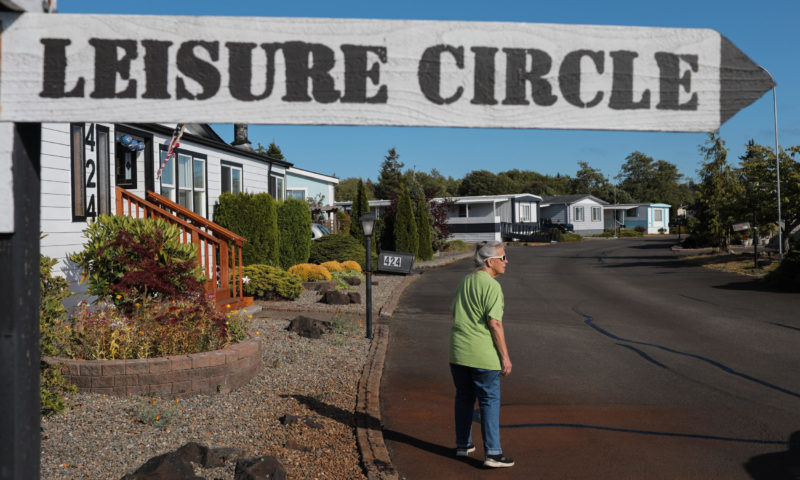By Farah Eltohamy and Mai Hoang
Crosscut.com
From her pristine garden to her punchy graphic t-shirts, 78-year-old Judie Short emanates a great warmth and appreciation for everything around her.
Upon entering her home in Aberdeen’s Leisure Manor Estates, guests find an office nook lined with vintage knickknacks and Seattle Seahawks memorabilia. Her kitchen shines in a resplendent shade of cherry red, and its many windows let in sunlight that carries on to the rest of the house. It’s a three-bedroom home, but she has converted the second and third bedrooms into a cat-themed craft room and a playroom for when her grandchildren come to visit.
“When we moved in five years ago, it was going to be an affordable place to live and everybody here got along so well,” she said. “We had activities and you could go out and walk and visit with people, and it’s just a good community – and now everybody’s nervous and nobody knows what’s going to happen next.”
In late 2021, a Port Orchard-based mobile home management company, Hurst and Son LLC, acquired Leisure Manor in a string of pandemic-era purchases – and since then, its tenants have faced steep rent increases, threatening them with “economic eviction,” along with new alleged problems with upkeep and maintenance that did not exist before.
Hurst and Son’s growing presence in Washington reflects a broader pattern in which investors increasingly purchase and centralize such communities, making one of the last reliable options for lower-income housing less and less affordable. Lawmakers opened the door this year to expanding resident-led ownerships of park communities, but other proposals to regulate the industry and cap rising rents stalled. Leisure Manor has since become an example of how mobile park residents can band together with other communities to push back and defend their homes.
“This is not trailer trash,” longtime tenant Bill Hardy said during a recent tour of the park. His wife, Caroline, helped found a new tenants association and has rallied neighbors to organize in opposition – from filing complaints to the state attorney general’s office to coming out in support of a rent notice ordinance at their local city council.
“We’re hoping to get all these people together,” Caroline Hardy said, “so that we can fight.”
Leisure Manor Estates – a lush, idyllic community tucked off Highway 105 — has long served as a retreat for seniors away from some of the surrounding small-town dreariness. Pastel homes line the streets, front lawns lovingly adorned with kitschy lawn gnomes and wooden figurines. An average day is quite still – save for the occasional dog bark or cheerful greeting between neighbors on their morning walks.
In this community, everybody knows everybody – and despite the supposed impermanence of these homes, many of Leisure Manor’s tenants have settled into this steady way of life for decades. When Hurst and Son took over the park in late 2021, their lives were upended – and many “For Sale” signs have since gone up throughout the nearly 200 lots.
“I came home from my walk this morning, seeing those other for-sale signs, and just wanted to throw a sign on the front of our place,” Short said. “I just wanted to get the hell out of here.”
Residents said they paid around $485 in rent and utilities under the previous management. Now, with Hurst and Son’s most recent rent proposals, residents will be expected to pay closer to $750 – an increase of approximately 55 percent. Residents also told Crosscut that Hurst and Son introduced separate charges for garbage and sewer services, costing community members close to an additional $100 a month.
They said Hurst and Son also cut landscaping service, leaving residents to mow their own lawns and maintain common areas. Older residents, some in their 90s with limited mobility, now pay additional costs to hire lawn services. If residents don’tt comply with Hurst and Son’s rules on mowing or parking, they risk a $65 fee per violation.
“It’s a real racket. Maybe I’m just jealous that I didn’t think of it,” Short quipped.
Run by husband and wife Caleb and Kristina Romack, Hurst and Son has acquired 60 mobile home parks since 2017, according to the company’s website, with many purchased during the pandemic. The company now lists 73 manufactured home communities across five states, including 56 in 21 Washington counties. The company also owns several commercial properties.
Records from several county assessor offices indicate Hurst and Son spent at least $116 million on 35 parks in Washington in the past six years. Many were purchased well above assessed value, including Leisure Manor Estates, which was purchased for $11 million, close to double the county’s assessment value of $5.6 million. (Federal data shows the company also received approximately $200,000 in pandemic economic aid in 2020.)
The company continues to expand into other parts of the Northwest with purchases in Idaho and Montana and even has gone as far as North Dakota, where it owns three parks.
Caleb Romack declined to comment when Crosscut reached him on his cell phone. The Romacks didn’t respond to multiple e-mails or voicemails requesting response to complaints in this story. The couple have pledged to address complaints or park damage in previous news stories. In e-mails to state officials, Hurst and Son contends it is following relevant laws.
Earlier this year, the Yakima Herald-Republic detailed rent hikes at Hurst and Son communities in Yakima e.coli contamination in the water at one of those parks. The Moscow-Pullman Daily News covered a meeting in March when residents from Hurst and Son communities in Moscow, Idaho in light of rent raises and limits on selling their homes.
Bellingham tenants shared similar complaints last year.
For this story, Crosscut spoke with dozens of Hurst and Son community residents across the state, housing advocates, and lawmakers. Crosscut also obtained lease records, e-mails between the company and residents, property sale records, and consumer-complaint data from the state attorney general.
In recent years, many mobile-home community landlords have grown rapidly, acquiring and consolidating management over parks amid an explosion of investor interest. Residents say new owners often implement steep rent increases and cut services that reduce property values and quality of life.
Management companies have argued that rent increases are necessary to keep up with market rates and to make improvements to communities. Some sell potential investors on purchasing manufactured-home communities by saying such homes add to a region’s housing stock and help improve housing affordability.
However, Victoria O’Banion, who works with manufactured-home owners in Washington and Idaho to form ownership cooperatives to buy their communities, argues such rent increases are part of a multi-year “gentrification cycle.” She said the end game is to move residents to higher rents and flip the park for many times the purchase price. In other words, the communities become another housing option for higher-income earners, while those with tighter incomes are left with fewer choices. Seniors and other fixed-income residents increasingly get priced out of one of the last accessible housing options.
“Eventually,” she said, “’grandma Sally’ is economically evicted.”
Deb Wilson and Caroline Hardy, long-term residents of Leisure Manor, said they had no experience organizing or networking before Hurst and Son took over the Aberdeen park. Now, they feel like it might be their best chance to save the community they love.
Shortly after the Hurst and Son acquisition, the women began to notice how deeply the rest of their community bore the weight of management. They said tenants confided their fears of no longer being able to afford to live there and of speaking up about any other inconveniences within the park.
The women contacted Anne Sadler, a longtime mobile-home owner in Mount Vernon and president of the Washington Association of Manufactured Homeowners. Sadler had kept an eye on Hurst and Son and said their practices have become increasingly predatory in recent years.
“They’re all about the money, that’s all they care about. They care nothing about these people,” she said. “Another little, frail, elderly woman who could barely struggle out of her unit came up to me and said, ‘I’m not going to be able to pay my rent. I’m not going to be able to live here. I have nowhere else to go.’”
With few options for legal recourse, Sadler has advised tenants to take up their concerns with the state attorney general, whose office oversees a manufactured-housing dispute resolution program for helping negotiate conflicts between residents and landlords. Hardy and Wilson said they’ve helped several neighbors submit complaints.
“The attorney general – we’ve got people filing complaints, but they don’t do much,” Hardy said recently. “You know, the system is there, but it’s functioning against these people.”
The state attorney general’s (AG) office has received at least 102 consumer complaints filed against mobile home parks owned by Hurst and Son since 2016, 82 of which are closed. The office declined to answer questions about its handling of them or interactions with Hurst and Son managers.
In e-mails between the AG and the company, regional managers said they followed all provisions of the Manufactured/Mobile Home Landlord-Tenant Act (RCW 59.20) in raising rents and notifying tenants.
Ishbel Dickens, a retired attorney with experience working in manufactured-housing tenant rights, said the act prevents homeowners from being evicted without any cause but doesn’t limit how far a landlord can raise a tenant’s rent, which has been the case with landlords such as Hurst and Son, who could evict residents “just by making it too expensive to stay there.”
In what they hope can serve as a template for other communities, Hardy and Wilson helped establish the Aberdeen Tenant Association in 2022 to collectively push for new protections, including a City Council-approved ordinance requiring more notice of rent increases at Aberdeen parks so residents have more time to adjust their finances or find new housing.
Wilson and Hardy said they’ll seek solidarity among other parks for a potential class-action lawsuit by meeting with other Hurst and Son residents in the Puget Sound area.
The manufactured-home industry often highlights its role in providing affordable housing, especially as home prices have spiked during the pandemic. In 2022, the average sales price for all new manufactured homes in the U.S. was $123,300 (not including the cost of renting underlying property), compared to $540,000 for a conventional-built home, according to the U.S. Census Bureau and U.S. Department of Housing and Urban Development.
Most residents who own manufactured homes must still lease the lot it sits on. Paying off their home doesn’t guarantee stability, since they still remain subject to the rental rates of the lot owner.
Many residents own homes that have become too old to move. They may be called “mobile” homes, but more often they are functionally anchored to their lots.
Washington’s Department of Commerce reports about 30 communities with a combined 582 lots have closed statewide since 2017. The agency offers a relocation program with technical and financial assistance to eligible residents — based on income — who are impacted by a community closure. However, there’s a limit to the amount of financial assistance — up to $11,000 for a single-wide home and $17,000 for a double-wide.
In some scenarios, owners may still have to sign over their home to the community owner because even with cash assistance, it might not be financially or practically feasible to move their home. The assistance might instead go toward finding other housing rather than preserving their home.
One resident who lived in the Hideaway community in Spokane for nearly 24 years said Hurst and Son had promised improvements to the park when they purchased it in 2015. They repaved the roads but have done little work since. Residents also complained about a new water fee policy that they said split water charges evenly across tenants each month instead of tracking use with individual meters, meaning a single retiree pays for consuming as much water as a large family household regardless of actual usage.
The Washington Legislature passed a new law this year requiring the state’s Department of Commerce to provide notifications when a mobile-home community goes up for sale, allowing residents a chance to band together to purchase them. Sen. Noel Frame, a Democrat representing Seattle’s 36th Legislative District, said she authored the bill after growing concerns over the “broader trend of displacement for low-income folks and seniors.” Frame said they “weren’t even getting an opportunity to compete or to purchase, and now they have that opportunity.”
The bill also builds in a penalty of $10,000 if landlords willingly fail to comply with notifying the state of a pending purchase. If the problem continues, Frame said, the attorney general’s office will get involved.
Commerce officials started listing community sales on the market in July. O’Banion and ROC Northwest has worked with two dozen owner-cooperatives to purchase communities in Washington and Idaho. O’Banion noted the average annual rent increase for resident-owned communities across the U.S. is just under 1 percent, well below the double-digit increases seen at Hurst and Son communities.
When a community goes up for sale, O’Banion said, ROC Northwest starts meeting with resident homeowners to assess the feasibility of a cooperative and vote on the matter. She said a successful cooperative generally needs the support of 57 percent of the residents and a strong commitment to collective ownership.
Given the upfront cost, the owners might still have to weather an increase, she explained, but the hope is that the lot rent will eventually stabilize.
O’Banion and other housing advocates argued mobile-home park residents still need additional help from state and federal agencies to compete with the deep pockets and aggressive management of investors looking to take advantage of these communities.
State Sen. Kevin Van de Wege, who’s from Sequim, introduced Senate Bill 5697 this year to prohibit mobile-home community rent increases larger than the rate of inflation, give the state Utilities and Transportation Commission new authority to regulate rates and services in those communities, and fine landlords up to $100,000 for violating the limits. The proposed legislation didn’t pass.
O’Banion said her organization and other advocates will continue working with legislators to push for additional policies, such as rent stabilization, to ensure continued affordability for manufactured-home owners.
“Manufactured homes must be preserved, maintained, and developed as part of the landscape of affordable housing,” she said.
Source: Crosscut.com, a non-profit Pacific Northwest news site. It’s part of Cascade Public Media.
HURST AND SON-OWNED COMMUNITIES IN PIERCE, KING AND KITSAP COUNTIES
Of the 56 mobile home communities in Washington owned by Hurst and Son, six are in Pierce and King counties:
- Sunrise Terrace Community, on Chambers Creek Road West in University Place.
- Seacoma Community, on outh 268th Street in Des Moines.
- Maple Lane Community, on Maple Lane South in Kent.
- Laurel Lane Community, on 96th Street South in Tacoma.
- Northwest Community, on San Francisco Avenue Southwest in Lakewood.
- Cottonwood Community, on 80th Avenue East in Puyallup.
Four more are in Kitsap County—Olympic View Community in Olalla and, in Bremerton, Rocky Point Community, Pinewood Park, and Aero Community. The 56 total locations are about evenly divided between the state’s west and east sides.
The company also own communities in Idaho, Oregon, Montana, and North Dakota.



